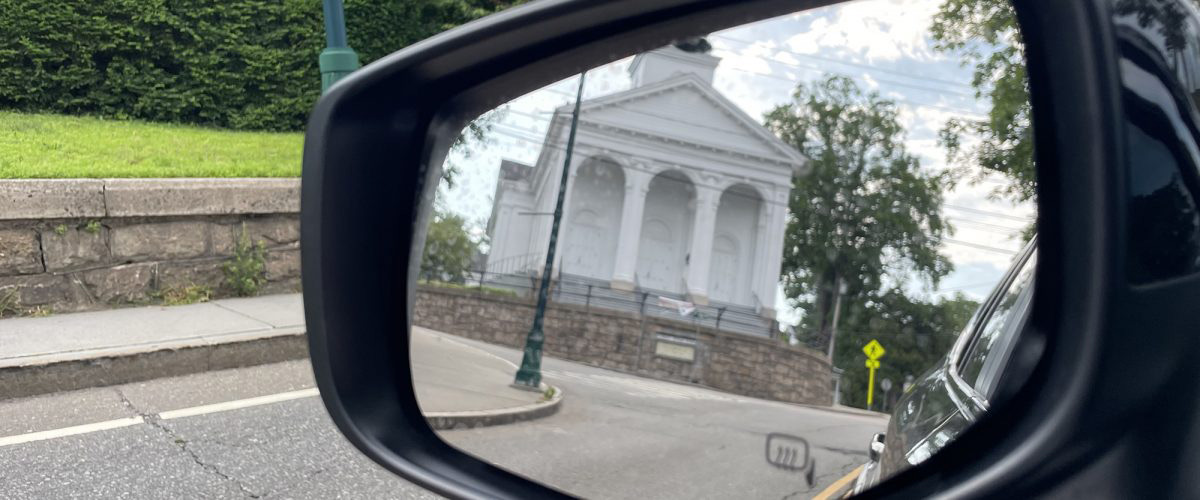My Long Farewell to Traditional Religion
(and What Remains)
By Martin Thielen
August 1, 2023
This article was originally published by Baptist News Global

If I had to summarize my religious journey with one Bible verse, I would choose Matthew 28:17, “When they (the early disciples) saw him (the risen Christ), they worshiped him; but some doubted” (NIV).
For over fifty years, since my affirmation of faith and baptism as a teenager, I have worshipped God and Christ. But like some of the early followers of Jesus, I have also doubted. A lot. This is my story.
My faith journey began at age fifteen when I walked down the aisle of a Southern Baptist Church in Muskogee, Oklahoma, took the preacher by the hand, and said, “I want to be saved.” For several years after that experience, I believed in God, Christ, and the church without doubts or questions.
But that blessed state of certainty did not hold. In the years and decades that followed, I struggled with one doubt after another as I slowly (and often painfully) bid farewell to many tenets of traditional religion. A few highlights follow.
Losing Faith
I lost faith in a literal Bible. Although my church taught me to believe in an “inerrant and infallible” Bible, I wasn’t so sure. For example, the overwhelming violence in Scripture, including God-ordained genocide, deeply disturbed me. And many of the supernatural stories were a stretch for me to believe. I also noticed how badly women were treated in Scripture and was confounded by its complete acceptance of slavery. By my early twenties I could no longer believe (with any integrity) in a literal Bible, which brought me a boatload of trouble in the SBC. [For further reflections about losing faith in a literal Bible, see For the Bible Tells Me So? ]
I lost faith in the evangelical church. My early ministerial years in the Southern Baptist Convention felt overshadowed by the relentless and ruthless fundamentalist takeover of the denomination. In the end I lost faith not only in the SBC but also in the entire evangelical enterprise. I came to the difficult conclusion that I could no longer participate in a religious tradition that was (at least in part) anti-women, anti-reason, anti-science, antigay, anti-ecumenical, mean-spirited, arrogant, judgmental, angry, racist, and highly partisan. Although it was painful to forfeit the many benefits I enjoyed (big-steeple churches, significant publishing venues, and a high-status national denominational position), I left the evangelical world and transferred to a more progressive tradition. [For further reflections about losing faith in the evangelical church, see Why I Left Conservative Evangelicalism and The Toxic Evangelical Variant. ]
I lost faith in traditional doctrines. For decades I struggled with numerous orthodox beliefs. For example, I simply could not believe that God eternally torments people in the flames of hell for holding erroneous beliefs. Or that non-Christian and nonreligious people have no hope in this life or the next. Or that God required a violent and bloody sacrifice of God’s Son in order to forgive sins. Although I often recited the Apostles’ Creed in worship on Sunday mornings, I had severe doubts about many of the affirmations. Given this growing list of doctrinal doubts, I began to wonder about my future as a clergyperson. [For further reflections about losing faith in traditional doctrines, see On Losing and Keeping Faith, The Benefit of the Doubt, The Night I Stopped Believing in Substitutionary Blood Atonement, and It’s (Past) Time to Raze Hell. ]
I lost faith in the providence of God. After years of watching members of my congregations suffer from awful diseases like cancer, ALS, and dementia; and burying a significant number of children, youth, and young adults; and observing enormous worldwide suffering every day in the news, I experienced the death of providence. It became clear to me that in a universe of overwhelming and brutal suffering (both in the natural world and in human history), God does not providentially care for creation in any traditional sense. Losing faith in a literal Bible, the evangelical church, and numerous doctrines had been difficult for me (although liberating). But losing faith in the providential care of God felt spiritually devastating, both personally and professionally, and I never fully recovered. [For further reflections about losing faith in providence, see Providence and the Pandemic. ]
I lost faith in institutional religion. Over time I realized that my frustration with organized religion was bigger than my disgust with the evangelical church. I came to see that every branch of Christianity (evangelical, mainline, Catholic, and Orthodox), including my own United Methodist Church, was toxic and dysfunctional in massive ways, perhaps beyond redemption. I experienced this on a personal level when I pastored a cruel and abusive megachurch that killed my vocational joy. But I also saw rampant ecclesiastical toxicity everywhere I looked, both historically and currently. I finally admitted to myself the painful truth—the church of Jesus Christ (past and present) has miserably failed to live up to its ideals. Clearly, the church as we know it is not what Jesus intended. At that point in my journey, I had severe doubts about my future participation in such a deeply broken and flawed institution. [For further reflections about losing faith in institutional religion, see What to Do about Church?, Leaving Church?, The Self-Destructive American Church, Retired from Religion, Jesus-less Christianity, and Church on Fire. ]
I lost faith in a traditional God. Historic Christianity believes in a personal, loving, supernatural, trinitarian, all-knowing, all-powerful, all-present heavenly Father who supernaturally intervenes in the world, answers prayers, and performs miracles. It also believes in a divine Christ who preexisted before creation, was born of a virgin, performed mighty miracles, died for our sins, physically rose from the dead, established the church, ascended into the sky, will come again one day to end the age, send people to heaven or hell, and then return to his heavenly throne seated at the right hand of God where true believers will eternally worship him.
By my early sixties many of these traditional doctrines about God and Christ became impossible for me to believe. At that point I knew my shelf life as a clergyperson had come to an end, and I grieved the loss of both my faith and my vocation. Some clergy successfully navigate similar waters without leaving ministry, and I do not judge them. But for me, continuing to serve a traditional church without affirming its belief system felt incongruent and disingenuous. So, several months later, I took early retirement and departed vocational ministry. [For further reflections about losing faith in a traditional God see God Is No Longer a Working Number: Rethinking Christianity in the Twenty-First Century, Orthodox No Longer, Three Possible Paths for People Who Lose Traditional Religion, and An Inconvenient Loss of Faith: A Theological Novel. ]
Embracing Faith
Although the above reflections provide an accurate (although oversimplified) overview of my religious journey, it’s not the whole story. Although I’ve lost much of my original faith, I still affirm many aspects of spirituality. To that subject I’ll now turn.
I still believe in God. Not the God of fourth-century creeds or orthodox systematic theology. Instead, the God I believe in is far less definable and predictable. For example, I believe in a God who is, among other things, a mysterious, evolutionary, life-force, energy-force Spirit of the universe. This God cannot be placed in a box and fully understood. And I’m perfectly comfortable living with all the ambiguity and uncertainty that entails.
I still love Jesus. Although I harbor doubts about many traditional Christological doctrines, I have a huge affinity for the Jesus who loved sinners, extended grace, welcomed outsiders, blessed children, exhibited compassion, engaged in acts of kindness, challenged fundamentalist religious leaders, and demanded justice. I still consider myself to be a follower of Jesus and seek to emulate his teachings, example, and spirit.
I still hold all of my values. In spite of my theological struggles, none of my core values have changed. They included (and still include) love, mercy, grace, honesty, reason, responsibility, authenticity, generosity, tolerance, kindness, service, education, freedom, inclusion, and justice. These values inform everything I do and are central to my life.
I still care about the church. In spite of my overwhelming frustration with organized religion, I’m grateful for the many gifts the church gave me, I appreciate the good it does in spite of its massive flaws, and I still want it to succeed (although radical changes need to occur before that is possible on a large scale). I also care deeply about clergy and seek to encourage them whenever possible. Although I’m currently on a sabbatical from institutional religion, under the right circumstances, I’m open to returning.
I still engage in ministry. I don’t pastor a traditional church anymore. But through my work with Doubter’s Parish and other publishing venues, I serve as a “pastor” to a congregation of seekers, strugglers, and other thinking people who are trying their best to navigate faith in the twenty-first century. I do this primarily through writing but also through email correspondence, phone calls, speaking engagements, and occasional face-to-face visits.
I still experience Christian community. For example, I belong to an ecumenical group of seven retired progressive clergy. We gather regularly to discuss life and faith and to support one another on the journey. It has, for all practical purposes, become my current church. I’m also part of a small UMC clergy group who have met together for decades. We still gather on a regular basis. In just a few weeks we are taking a road trip together to Florida. I also have many individual friends who are part of a meaningful web of Christian community.
I still attempt to live a Christian life. After my retirement, I finally came to realize that authentic Christianity is not primarily about beliefs or institutions. Instead, it’s about a way of life. This insight hit me as I reread the New Testament. Freed from vocational restraints, I was able to fully see (for the first time) that Jesus cared little about traditional religious trappings. For example, his Great Commandment (to love God and neighbor), his Golden Rule (to treat others the way we want them to treat us), and his core teachings (as seen in the Sermon on the Mount), had virtually nothing to do with conventional religious concerns.
Religiosity didn’t interest Jesus; ethical and loving behavior did. Today, as much as ever before, I try to carry out Jesus’s call to live a life of love.
And so the journey goes on. I’m sure that in the years ahead, my faith, like yours, will continue to evolve. And as long as I am able, I’ll continue to write about it. Thank you for reading!
AUTHOR’S NOTE
To share this post, please click the appropriate icon at the bottom of the page. If you would like to communicate with me, feel free to send an email and I’ll respond as soon as possible. To receive my monthly newsletter (a brief email notification alerting you to new posts and other materials), please do so today. Thank you for your interest in Doubter’s Parish. Writing for you is a joy.
